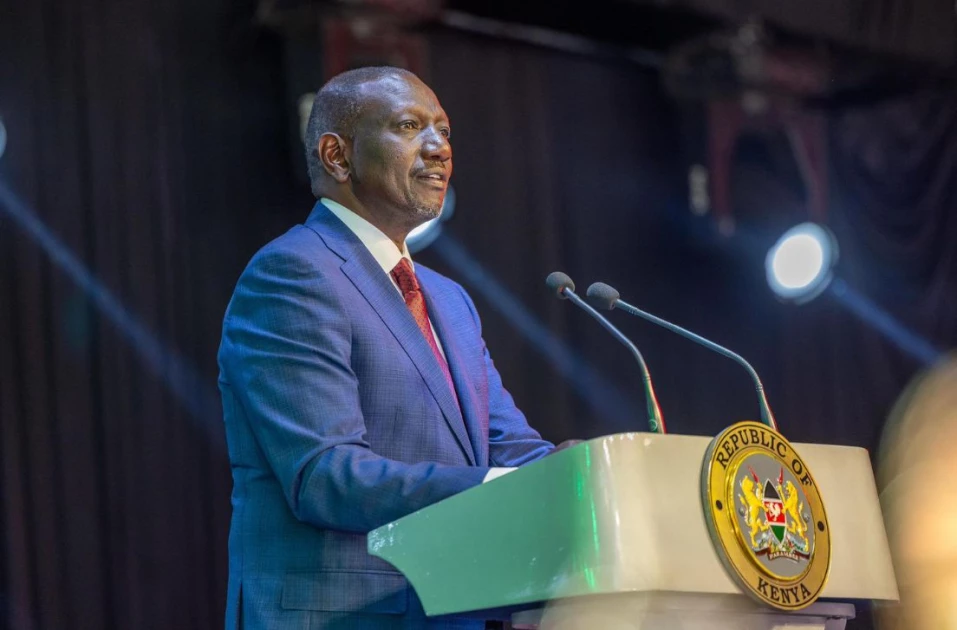Gov't to commence paying SHA contributions for needy Kenyans: Ruto

President William Ruto speaks at the 97th Kenya Music Festival State Concert, Sagana State Lodge on August 16, 2025. Photo/PCS

Audio By Vocalize
The President said the initiative follows the completion of a successful identification process. He noted that this step will ensure no one is left out of the universal health coverage plan.
He pointed out that those who have the ability to pay are contributing 2.75 per cent of their income, making the scheme equitable. Consequently, the government has been collecting enough funds to cater for those who cannot afford.
“The National Hospital Insurance Fund (NHIF) was discriminatory. Mama Mboga used to pay Ksh.500, the equivalent of 10 per cent of their income. I used to pay Ksh.1,700, which was equivalent to 0.01 per cent of my salary. This was unjust,” he said.
President Ruto made the remarks during a meeting with grassroots leaders from Meru County at State House, Nairobi, on Friday.
Deputy President Kithure Kindiki, Meru Governor Isaac Mutuma, National Assembly Majority Leader Kimani Ichung’wa, MPs and MCAs attended.
The President said SHA has so far registered 25.8 million Kenyans compared with the defunct NHIF, which had seven million members.
Saying SHA is serving all Kenyans who have registered, the President explained that outpatient services at dispensaries, health centres and sub-county hospitals are free.
The President also announced that the NYOTA business support programme will benefit 70 young small business owners in each of the country's 1,450 wards, a total number of 100,000 country.
“This programme will be launched on September 18, 2025. Young people should dial *254# to register,” he said.
On the economy, President Ruto maintained that Kenya is on a sound footing and capable of supporting priority development programmes.
He said the stabilisation measures he introduced upon assuming office in 2022 are now bearing fruit, with Kenya rising from the eighth-largest economy in Africa to the sixth.
The President explained that the government reduced borrowing and expenditure and began repaying its $2 billion Eurobond debt that had placed the country at the risk of default.
The measures, he said, have yielded results. Inflation has declined from 9.6 per cent to 4 per cent, while the shilling has strengthened from Ksh.167 to the dollar and stabilised at Ksh.129.
Foreign exchange reserves at the Central Bank have risen to Ksh.1.5 trillion ($11.8 billion) more than five months of import cover - from $5.7 billion (Ksh.738 billion).
“The economy of Kenya in 2022 is very different from the economy in 2025,” he said. "That is why you see our fortunes are turning around. We now have funds for road construction, a total of Ksh.170 billion, and contractors are back on site,” he added.
On national savings under the National Social Security Fund, the President explained that Kenyans had saved Ksh.320 billion between 1966 and 2023 when employees and employers were contributing Ksh.200 a month each.
But when the contributions for employees and employers were enhanced to 6 per cent each in 2023, the total savings have doubled to Ksh.640 billion in two years.
“By 2027, the savings will have risen to Ksh.1 trillion,” he said.
He also highlighted the reduction of Treasury Bill interest rates from 16 per cent to 8 per cent as evidence of economic stability. He urged Kenyans to expect bank lending rates to fall to below 10 per cent.
On agricultural reforms, the President said the government has registered 6.5 million farmers, making it easier to support them with fertiliser and seeds to increase food production and productivity.
“As a result, the cost of food has gone down because we have subsidised production and not consumption,” he said.
The President further noted that reforms in the dairy sector have made Kenya the leading producer of milk in Africa.
On education, he said the government has hired 76,000 teachers, addressed challenges in the Competency-Based Education and Training, and introduced a new funding model for colleges and universities and ensured no learner is left behind.
To deal with the challenge of unemployment, President Ruto cited the Affordable Housing Programme and the construction of modern markets as job creation avenues.
“A total of 170,000 Affordable Housing Programme units are under construction, employing 340,000 young people,” he said.
President Ruto also said more opportunities have also been created through the digital economy under the Jitume ICT hubs and labour mobility initiatives.
On the Hustler Fund that was launched on November 30, 2023, the President said it has disbursed Ksh.75 billion to more than 26 million Kenyans. The provision of this collateral-free credit, he explained, has enabled small-scale entrepreneurs to boost their businesses.
In regard to miraa farming, President Ruto announced that the government has secured a new market in Djibouti. This, he said, will expand miraa business for farmers and traders in the county.
Meanwhile, Ksh.7 billion has been allocated for the construction of Nithi Bridge beginning November 2025, with the President saying many lives have been lost at the accident-prone area.
He also announced that Ksh.2.5 billion will be used to upgrade roads in Meru Town and its environs in preparation for city status for the town.
The President declared he will not be distracted and he would focus on programmes that transform Kenya. He expressed his commitment and determination to get the job done.
“I was not elected to be popular; I was elected to transform Kenya," the President said.
Prof Kindiki reaffirmed Meru County’s support for the government, saying it remains intact and will back the Kenya Kwanza administration in securing a second term.
Governor Mutuma commended President Ruto’s development agenda for Meru, citing the Nithi Bridge project as a key undertaking whose benefits will extend beyond the county.


Leave a Comment